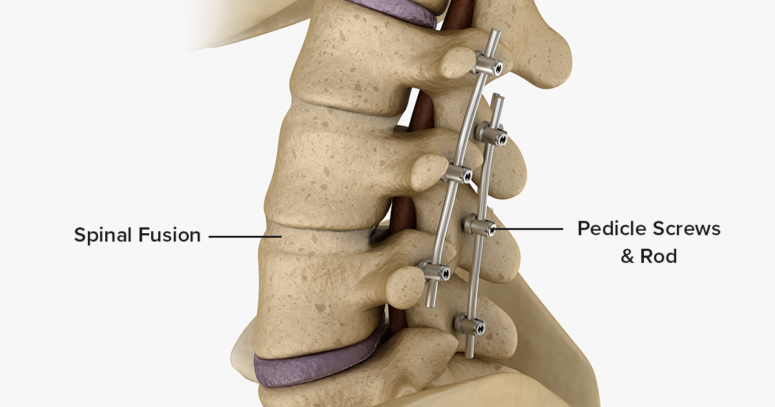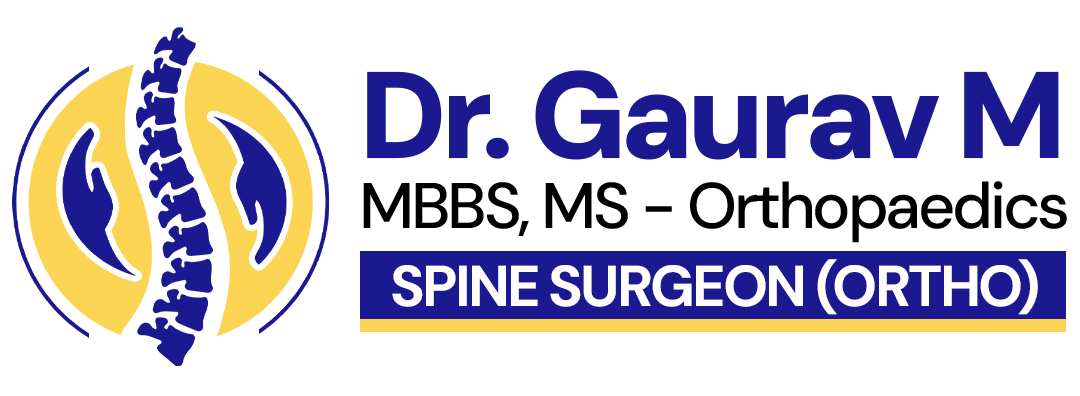Opening Hours
Mon to Sat
6:00 PM – 9:00 PM
Sunday
Closed
Relief Begins with the Right Care
Experience advanced spine and orthopaedic treatment tailored for you.
- Full Endoscopic Interlaminar / Transforaminal Discectomy
- Full Endoscopic Decompression for stenosis
- Full Endoscopic revision Discectomy
- Foraminoplasty
- Minimally invasive fixation for Spinal fractures
- Kyphoplasty and Vertebroplasty
- Anterior Cervical Discectomy and Fusion (ACDF)
- Transforaminal Lumbar Interbody Fusion (TLIF)
- Oblique lumbar interbody Fusion (OLIF)
- Minimally invasive Trans Kambin fusion surgery (OLLIF / KLIF)
- Full Endoscopic Fusion surgery
Spinal Fusion Spinal Surgery: Restoring Spinal Stability and Comfort

Spinal issues like chronic back pain, instability, and nerve compression can significantly impair daily life. In many cases, these symptoms result from degenerative disc disease, spinal fractures, deformities, or conditions like spondylolisthesis. When conservative treatments like physiotherapy, medications, or injections fail to provide lasting relief, Spinal Fusion Spinal Surgery may be the most effective option to stabilize the spine and restore functionality.
If you’re experiencing persistent spinal discomfort and are exploring advanced treatment options, Spinal Fusion Spinal Surgery in Rajajinagar offers a reliable solution performed by some of the most skilled spine surgeons in Bangalore.
What is Spinal Fusion Surgery?
Spinal fusion is a surgical procedure used to join two or more vertebrae together permanently, eliminating motion between them. This helps in stabilizing the spine, relieving pain, and correcting deformities. The fusion process involves placing bone grafts or bone-like materials between the affected vertebrae, often supported by metal plates, screws, or rods.
Once fused, the vertebrae heal into a single solid bone, preventing movement that could irritate spinal nerves or cause further damage.
Conditions Treated with Spinal Fusion
This surgery is primarily used to treat:
- Degenerative Disc Disease – when spinal discs deteriorate and cause pain or instability
- Scoliosis or Kyphosis – spinal curvature disorders needing correction
- Spondylolisthesis – one vertebra slipping over another
- Fractures – due to trauma or osteoporosis
- Spinal Infections or Tumors – where structural integrity is compromised
- Chronic Low Back or Neck Pain – when instability is the underlying issue
Your spine specialist will typically recommend spinal fusion when less invasive treatments have failed, and imaging studies confirm mechanical instability in the spinal column.
Types of Spinal Fusion Procedures
There are different approaches depending on the spinal level involved and the patient’s anatomy:
1. Posterior Lumbar Interbody Fusion (PLIF)
Performed from the back of the body, involving disc removal and placing a graft between vertebrae.
2. Anterior Lumbar Interbody Fusion (ALIF)
Accessed through the abdomen to reach the spine, allowing for less muscle disruption.
3. Transforaminal Lumbar Interbody Fusion (TLIF)
A more targeted approach through the side of the spine to minimize nerve irritation.
4. Cervical Spinal Fusion
Used for neck issues like herniated discs or instability between cervical vertebrae.
The type of fusion depends on the affected spinal region, the nature of the disease, and the patient’s overall health and goals.
How the Procedure is Performed
Spinal fusion is performed under general anesthesia and typically lasts between 2 to 4 hours. Key steps include:
- Accessing the spine through an incision (from the front, side, or back)
- Removing the damaged disc or bone material
- Inserting bone grafts or synthetic substitutes
- Securing the area with screws, rods, or plates
- Closing the incision and applying dressings
Bone grafts may be taken from the patient’s own body (autograft), a donor (allograft), or synthetic substitutes.
Benefits of Spinal Fusion Surgery
When performed by the Best Spine Surgeon in Bangalore, spinal fusion surgery offers numerous benefits:
- Long-term pain relief from unstable or damaged spinal segments
- Prevention of further degeneration or spinal deformity
- Improved spinal alignment and posture
- Enhanced ability to walk, sit, or stand without discomfort
- Reduced reliance on pain medications
Although it does eliminate motion at the fused segment, patients typically retain enough flexibility and mobility to resume most daily activities.
Post-Surgery Recovery and Rehabilitation
Recovery time varies depending on the complexity of the procedure, patient age, and overall health. Here’s what to expect:
- Hospital Stay: Usually 2–4 days for observation
- Pain Management: Controlled with medications and monitored for complications
- Mobility: Patients are encouraged to walk soon after surgery to avoid stiffness
- Physical Therapy: Starts a few weeks post-op to restore strength and range of motion
- Return to Work/Activities: Most people resume light activities within 6–12 weeks
Full fusion may take 6–12 months to develop, during which regular follow-ups with the surgeon are essential to monitor healing.
Risks and Considerations
While spinal fusion is generally safe, potential risks include:
- Infection at the surgical site
- Blood clots
- Nerve injury (rare)
- Non-union of the fused segment
- Adjacent segment degeneration (wear on nearby vertebrae)
Proper patient selection, surgical technique, and post-operative care greatly reduce these risks.
Choosing Expert Care in Rajajinagar
When it comes to complex spinal procedures, success heavily depends on the skill of the surgeon and the quality of post-operative care. Patients opting for Spinal Fusion Spinal Surgery in Rajajinagar have access to advanced diagnostic tools, state-of-the-art surgical suites, and comprehensive rehabilitation facilities.
Dr. Gaurav M, one of the most respected names in spinal care, brings extensive experience in performing spinal fusion with precision and care. His patient-first approach, combined with the use of minimally invasive techniques where applicable, ensures quicker recovery and better long-term outcomes.
Whether addressing degenerative conditions or correcting spinal deformities, Dr. Gaurav M and his team provide personalized care tailored to each patient’s needs.
Conclusion
Spinal fusion is a powerful surgical solution for many spinal conditions that cause instability, chronic pain, or nerve compression. When conservative treatments fail, this procedure can offer long-term relief, improved mobility, and a return to a pain-free life.
If you’re experiencing persistent back pain or have been diagnosed with a condition requiring fusion, it’s time to consult the Best Spine Surgeon in Bangalore. With accurate diagnosis, expert surgical care, and guided recovery, Spinal Fusion Spinal Surgery in Rajajinagar could be the next step toward regaining control of your spine—and your life.

